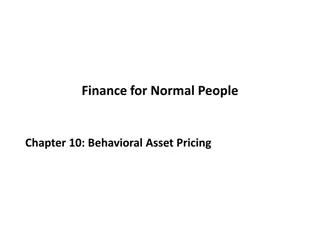
Utilitarian Principle in Business Ethics
Explore the importance of the utilitarian principle based on Jeremy Bentham's idea of maximizing utility for the greatest good. Learn how actions should aim to make things better and consider the ethical implications of choices through real-life examples and fundamental arguments.
Download Presentation

Please find below an Image/Link to download the presentation.
The content on the website is provided AS IS for your information and personal use only. It may not be sold, licensed, or shared on other websites without obtaining consent from the author. If you encounter any issues during the download, it is possible that the publisher has removed the file from their server.
You are allowed to download the files provided on this website for personal or commercial use, subject to the condition that they are used lawfully. All files are the property of their respective owners.
The content on the website is provided AS IS for your information and personal use only. It may not be sold, licensed, or shared on other websites without obtaining consent from the author.
E N D
Presentation Transcript
Utilitarian Principle A Course in Business Ethics Module 7 John Hooker Carnegie Mellon University May 2022
Importance of utility The utilitarian principle is based on the idea that one should try to make things better. Or as Jeremy Bentham put it, one s actions should maximize utility That is, create the greatest good for the greatest number On the principle of utility (1780) Jeremy Bentham Father of utilitarianism 2
Importance of utility The utilitarian principle is based on the idea that one should try to make things better. Or as Jeremy Bentham put it, one s actions should maximize utility That is, create the greatest good for the greatest number. For example, Bentham believed that criminal penalties should be designed to reduce crime rather than exact retribution. Jeremy Bentham Father of utilitarianism 3
Benthams skeleton dressed in his clothes, with wax head, in student center of University College London 4
Importance of utility For example, suppose I listen to loud TV in my hotel room at 2 am. Keeping other guests awake. Why is this unethical? Let s say it doesn t violate hotel rules. So it satisfies the generalization principle. 5
Importance of utility For example, suppose I listen to loud TV in my hotel room at 2 am. Keeping other guests awake. Why is this unethical? Let s say it doesn t violate hotel rules. So it satisfies the generalization principle. Problem: it reduces net utility. Maybe it makes me a little happier. But it substantially reduces utility of other guests. 6
Basic argument Step 1: An action is often a means to an end. You may want to achieve some goal. Maybe your ultimate goal is happiness. This was Bentham s suggestion. Whatever it is, let s call it utility. It s what you regard as inherently valuable, as the end to which your actions are a means. 7
Basic argument Step 2: If I regard something as inherently valuable... I must regard it as inherently valuable for anyone (not just me). due to the universality of reason. 8
Basic argument Step 3: My actions should take everyone s happiness as seriously as my own. Bentham thought this means maximizing total net utility. This is adequate for most purposes. We will go with it for now. 9
Utilitarian principle An act is ethical only if I can rationally believe that no other act creates more net expected utility* and satisfies other ethical principles. *counting everyone s utility. 10
Utilitarian principle Why consider only actions that satisfy other ethical principles? Because behavior that doesn t satisfy other ethical principles is not action. And so is not a freely chosen option. So utility can never override the other principles. 11
Utilitarian principle Does the end justify the means? Only an end can justify a means. But only it can do so only if The means satisfies the generalization and autonomy principles. The disutility of the means doesn t offset the utility of the end. 12
Measuring utility What if it s hard to predict the outcome of a decision? I am not required to have a crystal ball. I need only make a rational determination, given the evidence. If there is no way to tell, the utilitarian principle is satisfied by default. 13
Measuring utility But I must make a reasonable effort to research the issue. The same effort I would invest in decisions that affect me. For example, it is irrational to buy real estate without checking into it. Find optimal tradeoff between research and need to act. This is satisficing, a concept introduced by Herbert Simon. Don t waste time researching minor decisions. 14
Further reading J. N. Hooker, Taking Ethics Seriously, Taylor & Francis (2018), Chapter 4 J. N. Hooker, Advanced Introduction to Business Ethics, Edward Elgar (2021), Chapter 3 15





















